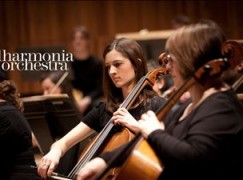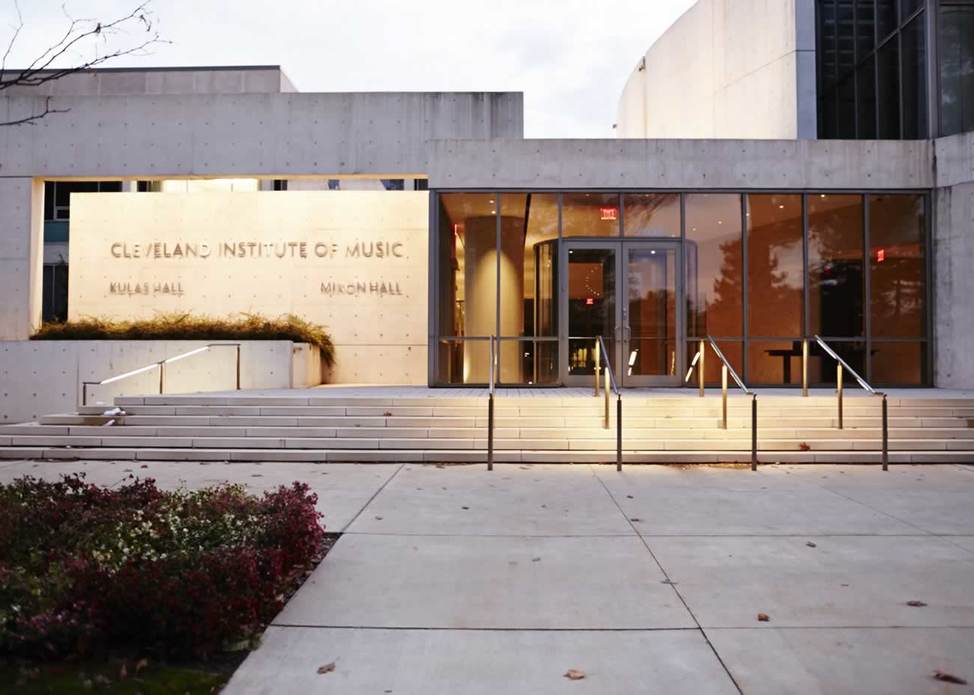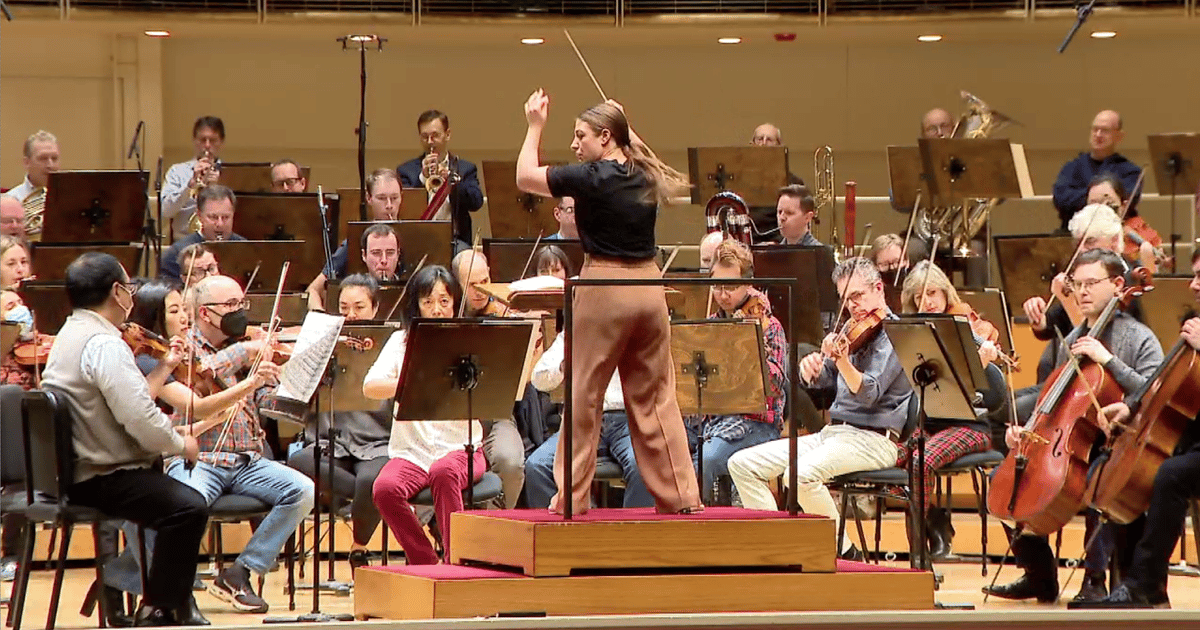Which Philharmonia Orchestra was playing last night?
mainAt last night’s Royal Festival Hall concert, there were no fewer than eight so-called Guest Principal players in the Philharmonia Orchestra.
The concertmaster, Vijay Gupta, was imported from the LA Phil. The flute, Philippa Davies, outstanding in the Dvorak 8th solos, is one of the best session players in town.
But eight substitutes on the front line – including clarinet, harp, timps, viola – and in a prime Sunday-night concert with a world class soloist and conductor – is more than a team can bear and still retain its core identity.
This did not look, sound or comport itself on stage like the Philharmonia Orchestra. This was subs night.






What are you trying to say, Norman? I know for a fact that there were at least some trialists performing last night. Furthermore, if you think about the amount of concerts that happen in London during your average week and the amount of talented and eager young players looking for work at the moment, in a way we should probably be happy that the Philharmonia have a decent extras list.
For any orchestra I have followed in my life, WHO is playing matters. Back in the day, if you went to the Chicago Symphony and didn’t see Ray Still, Larry Combs, Dale Clevenger and Adolph Herseth, it wasn’t the Chicago Symphony. Eight guest principals – when an orchestra has about 15 principals (counting, tuba but not English Horn or Piccolo) – is a lot.
Ok, I’ll bite. How else do you expect us to fill jobs and or vacancies other than having trialists and guests?
For example, let’s look at the bass section – we have 6 members. We use 8 for festival hall concerts. A lot of the work for the orchestra takes the form of out of town concerts for which we can only fit a section of 6 on stage. So extras are essential for us to be able to put on concerts which require a full string section. That’s just the way it works. If you don’t like our concerts just say so – don’t try to say that we as an orchestra can’t be bothered to turn up, because that isn’t the case.
I suppose my point is that to some degree it’s actually always subs night, as they’re an essential part of the London orchestral music scene. As anyone who actually knows anything about orchestras in this city will tell you.
Subs are a fact of life. I have them in my professional vocal ensemble, Schola Adventus. As long as they are well chosen its not a problem.
Philharmonia were sounding great in Gerontius last night btw:)
Orchestral musicians are entitled to holidays, sick leave, retirement, other playing/conducting engagements, professorial engagements etc.
So, are you implying this is why they sounded lackluster next to Trifonov? Or is Temirkanov to blame? Or Trifonov?
Would you have known from the performance, which you don’t comment on? Or doesn’t that matter?
Yes. Absolutely. And I may even have known if I’d heard it on radio. It sounded nothing like the Philharmonia. More like the RPO on a bad subs day.
Hmmm…maybe, maybe not.
Orchestras are always told they should use blind auditions but the integrity of music columnists is always impeccable.
The Philharmonia have a small but growing reputation for this. Eight subs isn’t even the half of it.
Particularly on out-of-town dates the Philharmonia often feature the B-team, and all-too-often I fear local audiences are cheated by not really hearing “the Philharmonia”.
I attended two Sunday afternoon Southbank concerts not long ago, featuring effectively different orchestras both under the Philharmonia brand. One was very average, one was excellent.
Allowing trialists and others is fine and part of normal orchestral life. Having a B-Team go to Norwich or Plymouth because sufficient regular members don’t want to travel is less acceptable.
It used to be the RPO who had the reputation for “which orchestra will we get tonight?”, but no longer just them.
We see it quite a lot up in Scotland with the likes of the SCO, some weeks there are literally a handful of members in the string section! Thankfully there’s a fantastic pool of extra players, so it doesn’t seem to have much effect on the quality of playing. It remains a valid question though; at what percentage of extra players does an orchestra become a scratch band?
As I understand it- the Philharmonia has vacancies for harp, timpani, section leader viola. They have one leader but are looking to fill the second leader position. This is also the case with the principal flute and clarinet . Who exactly would you expect to see playing in these vacant seats? Your comments are unhelpful and ill informed.
What is unhelpful is to find an orchestra fielding a team of trialists and subs. That is more than unhelpful. It is borderline RPO.
It has little to do with the vacant seats (a handful of which are to be expected and, filled with appropriate substitutes / trialists, won’t be a problem) and more to do with a whole bunch of extras / subs / non-members turning up in significant quantity. Over recent years the Philharmonia seems to have done this more and more, particularly on gigs out of town, but occasionally in London too. It can prove detrimental to the quality of the music produced, and thus to the orchestra’s overall reputation.
While in many countries you win vacant seats and go on a 1-2 year probation period, it seems that London orchestras put a handful of people on trial for what feels like years. I’m sure it does give the orchestras a much better picture of the respective candidates and saves them the embarassment of sacking them again (VSO take note!), but it means that it takes a long time for things to settle down. The LSO have found excellent brass players to fill their ranks recently, but both oboe chair are vacant, so you could have different people at every other concert.
Dear Norman,
There is little I can add as my fellow contributors have adequately described the process by which vacancies are filled. I can assure you that, the excellent Philippa Davies apart, there were no deputy principals in last Sunday’s concert and the Philharmonia was enriched by the artistry of six (not eight) fine aspirants. Furthermore, in my view the quality of applicants for all positions is higher than at any point in the last twenty-three years which augurs well, not just for the Philharmonia but all London orchestras including our fine colleagues at the RPO.
I’m very sorry you didn’t enjoy last Sunday’s concert,
Gideon Robinson,
Chairman, Philharmonia.
Dear Gideon
Thank you for that clarification. Aside from the eight guest principals listed in the orchestra call-sheet, I spotted various deps – sorry, triallists – in other departments. There were things I enjoyed about the concert. But you did not sound like the Philharmonia. Even with Keith Bragg in his customary seat.
Sorry.
Norman
The high quality of applicants won’t make any notable overall change to the orchestra until there are vacancies for them to fill; it may be an unpopular suggestion, but have you considered re-auditioning of current members, or some process to ensure that all members are performing at the high standard you, and your audiences, might expect?
How did the orchestral list compare to say the concert given by Philharmonia/Valcuha recently that had deservedly exceptional reviews? The concert with Terimanov was good but that ‘verdict’ was as much down to the interpretation of the Dvorak by the conductor as anything else-to my ears too loud for too long!
I think the ‘problem’ with the guest musicians in principal seats may be related to budget cuts in the Arts that mean orchestras find having two principals per section is proving far more difficult economically than even 15 years ago. You do notice that many of the joint principal positions the orchestra used to have even last year are now down to one only while yes, other positions are vacant.
Yet more ignorant rubbish from NL. How tedious. SL